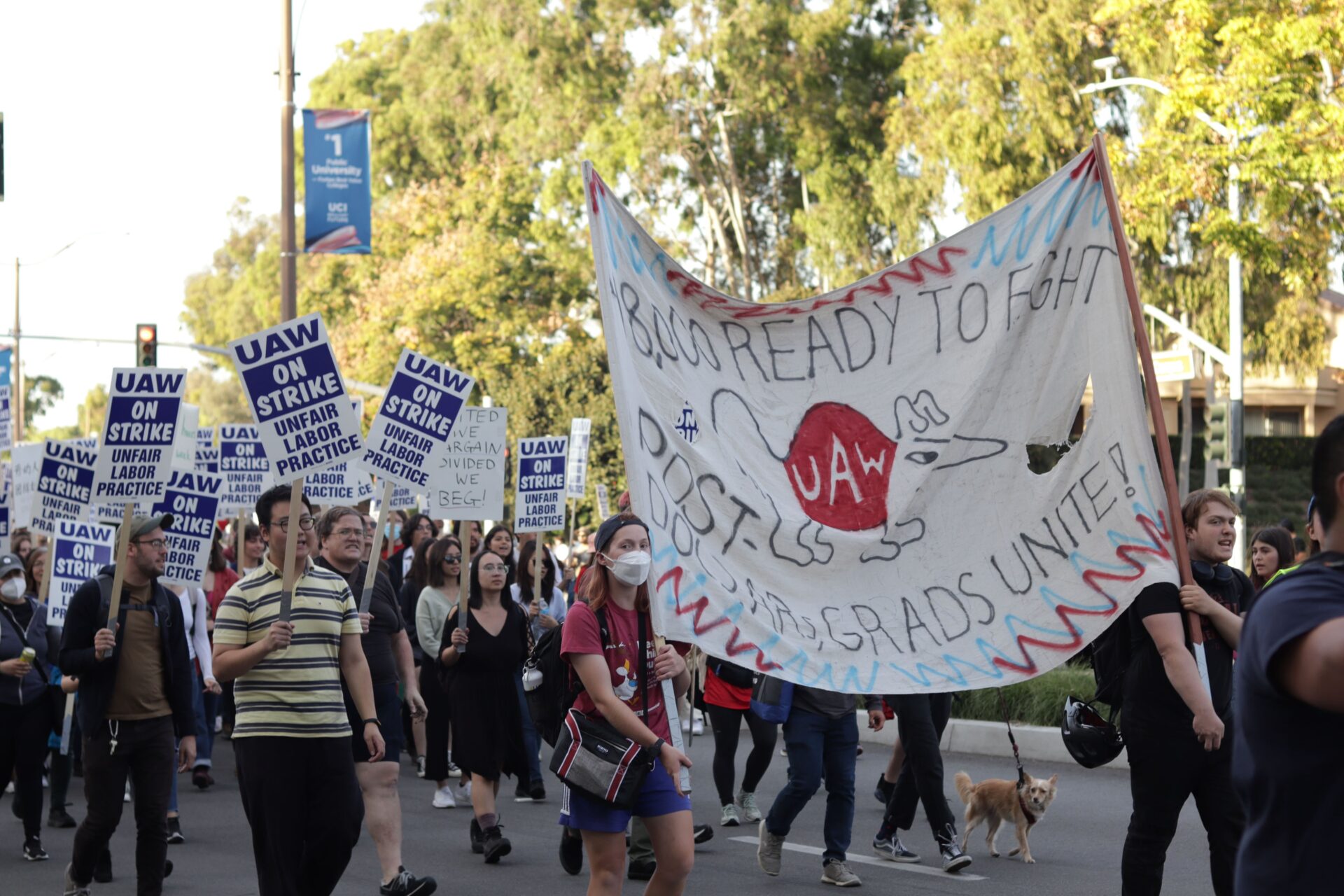United Auto Workers (UAW) strike captains led a large crowd of protestors to blockade the intersection of Bridge, Campus and West Peltason Drive in response to ongoing negotiations between the union and the University of California on Monday, Nov. 21. As the academic strike continued into its second week, tens of thousands of student workers, students and faculty have joined together across the UC system.
Earlier that afternoon, UCI faculty led a teach-in called “Labor Activism in the University and Beyond” near the steps of Langson Library where associate professor of English Annie Mcclanahan read a letter calling for more solidarity from undergraduate students written by a student who requested to use the pseudonym “Mars.”
The letter urges faculty members to cancel all classes, assignments, tests and grading, as well as refrain from holding Zoom classes until the conclusion of the strike. As it stands, many undergraduate students are willing to support the strike in ways that do not interfere with their performance in their courses, such as picketing in between classes.
“Undergraduates are the largest undermobilized population in the university, and have the highest, untapped, disruptive potential … if only they stopped going to class (aka crossing the picket line),” Mars wrote.
Mars highlights the difficult choice for students to choose between grades and supporting the strike due to the potential impact to their financial aid, graduation and career opportunities. The letter claims that faculty members, such as professors, have the ability to “undo [this] social conditioning.”
“As fellow undergraduates, we unfortunately do not feel we have the power to undo the social conditioning in our peers, which prioritizes grades over graduate student wages and academic worker living conditions, but YOU, as faculty members, have the power to stop grading,” the letter read.
According to the Council of UC Faculty Associations’s (CUCFA) website, faculty members have the right to “respect a picket line” by withholding labor during a strike, including “the teaching of classes.” However, the organization also acknowledges that faculty may have their pay withheld for time “respecting a strike,” though they clarify that additional pay docks or “other disciplinary actions” are unlawful.
The University of California has commented on the UAW strike on their website, addressing various “priority issues” of the union, including fair pay, a respectful working environment, housing transportation subsidies, workplace accessibility and international student fees.
“Throughout negotiations, UC has listened carefully to UAW priorities with an open mind and a genuine willingness to compromise,” the UC stated on their website. “Negotiations are ongoing and tentative agreements have been reached on several important topics such as respectful work environment and health and safety matters.”
However, they acknowledge the continued disagreements with the union.
“At the same time, significant differences remain regarding a number of core issues. UC has proposed that UC and the UAW enter into mediation with a neutral, private mediator to help resolve the remaining differences,” the UC’s statement read.
The UC maintains that they are “committed to reaching agreements as soon as possible” as rallies continue throughout each of their campuses state wide.
At the teach-in near Langson, faculty speakers reflected on past strikes. Professors emphasized the current strike as a collective and continued movement throughout history, as opposed to a one-time event.
Professor and chair of urban planning and public policy Virginia Parks spoke about her time at UCLA in fall of 1995 when Thai garment workers joined the rallies for Affirmative Action weeks after they were freed from slavery at an El Monte garment factory in East Los Angeles.
“It was humbling to see these women who literally had been enslaved for years … coming out to support us,” Parks said.
According to the UAW’s website, between unionized and non-unionized workers, union workers are more likely to receive more benefits, such as paid sick days and access to health insurance. The UAW also claims to “negotiate in all sectors with all employers to keep members safe and establish necessary safety measures in the workplace.”
At the flagpoles, distinguished professor of English Rajagopalan “Radha” Radhakrishnan shared his experience entering the UC system after teaching as part of a fully-unionized faculty at The University of Massachusetts Amherst.
“When I came here, it felt really confusing, asphyxiating, alienating, angry, frustrating, [and] stultifying,” Radhakrishnan said. “To be in a faculty that was Senate faculty but non-union, I mean, that didn’t make any sense at all.”
Assistant professor of history Rasul Miller emphasized the importance of activist movements from the 60s until now as part of a “broader movement” among recent protests of Amazon and railworld workers.
“Right now, we are in a moment where the powers that be are trembling because we see an uptick in strikes,” Miller said.
Miller also affirmed the importance of communication between graduate students and professors during this time.
“The first thing I did when I heard there was a strike, I went to my graduate students and said ‘Y’all, tell me what you need me to do … because I don’t know. You need me to cancel class? What are we doing?’” Miller said.
As bargaining continues, undergraduates and faculty members have made their desire to stand together known across and beyond campus.
“By stopping grade activity, you are not depriving undergrads of their expensive education,” Mars wrote. “You are saying that their expensive education is worth more than the living wages of underpaid graduate students.”
Helena San Roque is a Campus News Staff Writer for the fall 2022 quarter. She can be reached at msanroqu@uci.edu.

